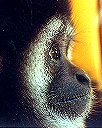 Meet Igor, one of IPPL's
Sanctuary Gibbons
Meet Igor, one of IPPL's
Sanctuary Gibbons
On 10 April and 30 May 1997, two large monkey shipments, each consisting of over 250 crab-eating macaques, reached the United States via Chicago.
Each shipment contained many babies, some just 3-4 weeks old, and nursing mothers. Air France carried both shipments.
Despite US humane shipment regulations banning international transportation of "a nursing mother with young, an unweaned mammal unaccompanied by its mother," a US Fish and Wildlife Service (USFWS) inspector at the port of Chicago cleared both shipments.
Either this inspector was ignorant of the regulation banning shipment of babies, or was grossly negligent in performance of his duties, or had been told by somebody higher up to let the shipments pass through.
In the case of the April shipment, the Chicago inspector claimed that 100% of the monkeys had been inspected when in reality, as he later admitted, he had not even seen the monkeys.
From Chicago both shipments were sent by truck to LABS, a monkey breeding facility located 900 miles from Chicago, in Yemassee, South Carolina.
The monkeys were supplied by Inquatex, an Indonesian animal exporting company.
There are suspicions that the company may have been exporting substantial numbers of wild-caught monkeys on documents claiming they were captive-born. Since 1994 Indonesia has banned export of wild-caught monkeys.
According to the 18 August 1997 issue of the Indonesian newspaper Kompas, the Inquatex facility owned:
500 parent stocks, 50 males and the rest are females, caught in nature.
This same Kompas article noted that the Inquatex firm exported over 900 monkeys in 1996 and had exported 473 monkeys as of August 1997.
Monkeys very seldom produce twins. The numbers exported were suggestive that wild-caught monkeys were being exported, along with legitimately captive-born animals.
Further, the tattoo numbers of some of the monkeys exported in 1997 were close in number to those of monkeys exported by Inquatex to another US importer in August 1992 (the shipment consisted of 110 monkeys carried by Lufthansa, all dead on arrival in Miami).
Documents for the 1992 monkeys were quite open in describing the imported monkeys as "wild-caught."
Shipping documents for the April and May 1997 monkeys showed that animals as old as 15-16 years were being exported - all or most of these animals probably born in the wild long before large-scale monkey breeding facilities were established in Indonesia.
Clearly there were grounds for US and Indonesian wildlife officials to investigate the shipments seriously.
In the case of the US, IPPL members contacting the USFWS have been repeatedly assured that an investigation is under way. A typical letter from USFWS appears on this page.
IPPL's confidence in the USFWS claim that a genuine investigation is in progress is increasingly strained as months pass by WITH NOTHING DONE.
The baby monkeys were obviously babies - and it doesn't take over a year to confirm this, as their birthdays were listed on the shipping rosters prepared by the Indonesian exporter!
In the case of Indonesia, there appears to have been no investigation of the questionable captive-born status of many of the animals. Instead Indonesia created a major "loophole" for its pampered animal dealers!
Indonesia actually set up a 1998 quota for export of 650 wild-caught crab-eating macaques and 100 wild-caught pigtail macaques. The quotas in theory apply to animals declared by animal dealers to be "unproductive parents from captive breeding operations only."
In practice any such claims are almost impossible to verify. "Unproductive parents" could be created by, for example, removing males from the cage!
Under former President Soeharto, Indonesian wildlife law enforcement was such a joke that 1,000 smuggled highly endangered orangutans ended up in Taiwan, mostly kept as pets. Yet Indonesia has extended "paper protection" to orangutans since the 1930s.
At the 1992 Conference of the Parties to the Convention on International Trade in Endangered Species, held in Kyoto, Japan, 13 of the official 18-member Indonesian government delegation consisted of animal dealers, including at least one suspected smuggler.
IPPL believes that more letters are necessary - so please write the letters requested below!
MORE LETTERS NEEDED!
1) We request all members (US nationals and overseas members) to send courteous letters to USFWS Director Jamie Rappaport Clark, expressing concern that the investigation of the April and May 1997 monkey shipments from Indonesia to the US, which included baby, nursing and pregnant monkeys and older monkeys of dubious captive birth, is still not completed. Request an update on progress of the investigation.
Jamie Rappaport Clark, Director
US Fish and Wildlife Service
Washington DC 20240 USA
2) Please request your congressperson to contact Ms. Clark requesting information about the status of the USFWS investigation into the 1997 Indonesian monkey shipments. Representatives can be reached at House Office Building, Washington DC 20515 and senators at Senate Office Building, Washington DC 20510.
3) Please send a letter to the Embassy of Indonesia in your home country expressing concern that Indonesia has established a "loophole" to its law banning export of wild-caught monkeys. Request that the new government of Indonesia give a higher priority to control of Indonesia's animal dealers than its predecessor and that ALL of Indonesia's wildlife laws be strictly enforced.
His Excellency the Ambassador of Indonesia
Embassy of Indonesia
2020 Massachusetts Avenue NW
Washington DC 20036, USA
His Excellency the Ambassador of Indonesia
Embassy of Indonesia
38 Grosvenor Square
London W1X 9AD, England
 Meet Igor, one of IPPL's
Sanctuary Gibbons
Meet Igor, one of IPPL's
Sanctuary Gibbons